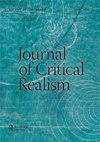Objects of virtue: ‘moral grandstanding’ and the capitalization of ethics under neoliberal commodity fetishism
IF 2.9
0 PHILOSOPHY
引用次数: 1
Abstract
ABSTRACT This article critiques conspicuous displays of morality within public discourse, recently framed as ‘moral grandstanding’, from the perspective of an intersubjective Critical Realist theory of ethics. Drawing on Honneth’s recognition theory as the basis of a ‘qualified explanatory critique’, I argue that these practices are not mere aberrations within moral discourse, but a necessary consequence of the neoliberal imperative to turn all aspects of the self into market assets. Neoliberal commodity fetishism also and especially involves the commodification of moral character as a means of economic competition, as exemplified in recent discussions of ‘ethical capital’. This objectification categorically precludes intersubjectivity as the basis of ethical life, and produces a cognitive structure resembling narcissistic pathology, characterized by the pervasive objectification of self and other. Critical Realists should therefore reject moral grandstanding not only for its detrimental effects on public discourse, but because in subordinating morality to the market, it is fundamentally anti-ethical.美德的对象:新自由主义商品拜物教下的“道德哗众取宠”与伦理资本化
摘要本文从主体间批判现实主义伦理理论的角度,批评了最近被定义为“道德哗众取宠”的公共话语中明显的道德表现。根据洪尼斯的承认理论作为“合格解释性批判”的基础,我认为这些做法不仅仅是道德话语中的偏差,而是新自由主义将自我的各个方面转化为市场资产的必要结果。新自由主义商品拜物教还特别涉及道德品质的商品化,作为经济竞争的一种手段,最近关于“道德资本”的讨论就是例证。这种客体化明确排除了作为伦理生活基础的主体间性,并产生了一种类似自恋病理学的认知结构,其特征是对自我和他人的普遍客体化。因此,批判现实主义者应该拒绝道德哗众取宠,不仅因为它对公共话语产生了有害影响,而且因为在将道德服从市场的过程中,它从根本上是反道德的。
本文章由计算机程序翻译,如有差异,请以英文原文为准。
求助全文
约1分钟内获得全文
求助全文

 求助内容:
求助内容: 应助结果提醒方式:
应助结果提醒方式:


